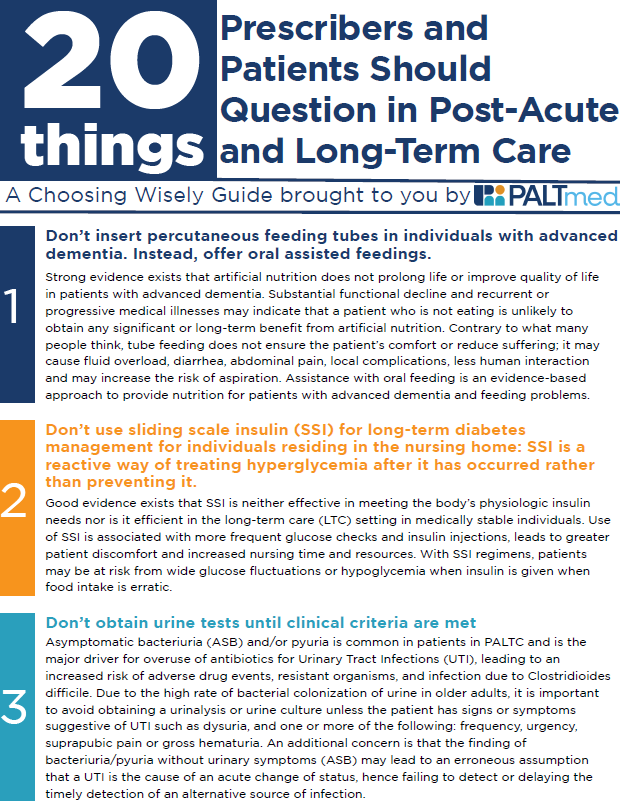April 11, 2025
The Choosing Wisely campaign was started by the American Board of Internal Medicine (ABIM) Foundation in 2016 to spark conversations about commonly used tests and treatments that lack strong supporting evidence. PALTmed, along with other specialty societies, has participated in the campaign since its inception by publishing recommendations to help the entire interdisciplinary team improve quality of care.
Until earlier this year, PALTmed had released 15 Choosing Wisely Statements. A few of them included:
- Don’t use sliding scale insulin (SSI) for long-term diabetes management for individuals residing in the nursing home.
- Don’t place an indwelling urinary catheter to manage urinary incontinence.
- Don’t recommend aggressive or hospital-level care for frail individuals without a clear understanding of the individual’s goals of care and the possible benefits and burdens.
- Don’t provide long-term opioid therapy for chronic non-cancer pain in the absence of clear and documented benefits to functional status and quality of life.
While ABIM no longer runs this campaign, the organization encouraged participating groups to continue developing and disseminating the statements on their own. Since the statements have always been popular with PALTmed members, the Clinical Practice Steering Committee decided to continue developing Choosing Wisely Statements and now has five more to add:
- #16 Don’t treat general musculoskeletal pain with muscle relaxants.
- #17 Don't prescribe iron supplements for more than once a day use.
- #18 Don't combine multiple medications with anticholinergic activity.
- #19 Don't use aspirin for primary prevention of atherosclerotic cardiovascular disease in patients aged 70 years or older.
- #20 Don't utilize molecular testing to replace urine culture for diagnosing and determining treatment for urinary tract infection.
Sing Palat, MD, CMD, chair of the Clinical Practice Steering Committee, explains that the process of compiling the new statements started 2 years ago with a survey of PALTmed members asking for recommendations regarding common practices that may not bring high value to patients. Then, she says, volunteers “narrowed down the number of proposed statements, conducted literature searches, wrote the statements, and submitted them to the PALTmed Board of Directors, who ultimately endorsed the current list.”
While she thinks the Choosing Wisely statements benefit her and other physicians—she says they help her scrutinize her blind spots and raise appropriate, critical questions within her community—she explains why they help all members of the interdisciplinary team: ”Having simple recommendations from a trusted source can be very powerful. Since individual circumstances vary and the interdisciplinary team carries multiple perspectives, Choosing Wisely statements serve as a starting point for understanding what the evidence says about common practices. The accessible, well-referenced recommendations may be the impetus for conversations about the necessity of specific diagnostic tests or therapeutics.”
You can find all of the Choosing Wisely Statements on the PALTmed website, and Dr. Palat encourages you to share and discuss them with your colleagues. “Send a link to a colleague. Discuss the recommendations and tie them to specific encounters and orders during quality assurance meetings with interdisciplinary team members. Print them to use as a reference during conversations with patients and responsible parties,” she says. “The statements have the most value when they help guide clinical decisions to improve patient care and also when they jump-start essential conversations about high-value care.”


